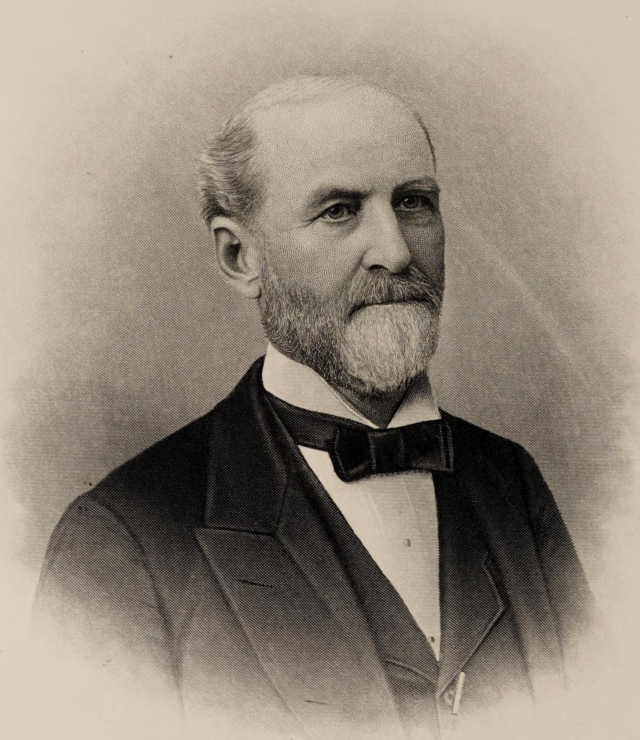“Lawyer Cassoday calls me his sister in law.”
Lavinia Goodell, June 30, 1874
One of Lavinia Goodell’s staunchest allies during her legal career was John Bolivar Cassoday. He offered her advice on cases, allowed her to use his extensive law library, and as a member of the Wisconsin legislature, introduced the bill that decreed that no person could be denied a license to practice law on account of sex, thus allowing Lavinia to be admitted to practice before the Wisconsin Supreme Court

Cassoday was born in New York State in 1830. He graduated from Albany Law School before moving to Janesville in 1857. He originally practiced with Harmon Conger, who went on to become a circuit judge (and was the person who allowed Lavinia to take the bar exam.) In the mid 1870s, Cassoday was in partnership with Edwin Carpenter. Their offices were located in Lappin’s block at the corner of Main and Milwaukee Streets.
Like the Goodells, Â Cassoday was a member of the Congregational Church. Ten days after Lavinia passed the bar exam, she reported to her sister:
We had an ice cream festival at our church Friday evening. Lawyer Cassoday waited on me to supper & was quite polite & agreeable. He calls me his sister in law.
Cassoday, like Lavinia, was also a member of the Mutual Improvement Club, one of Janesville’s literary societies. Although there is no indication that Cassoday ever questioned Lavinia’s legal acumen or treated her differently than he did male lawyers, that did not mean that he believed in total equality for women. In November 1876, Lavinia wrote to her cousin Sarah that she had heard Cassoday lecture on “Heroes of the higher grade.” She said:
He spoke, toward the close of woman heroes & mentioned Florence Nightingale & Margaret Fuller. Afterward, said that while he was willing women should do all they could do well, he was not in favor of their trying to do men’s work (whatever that is!)…. I couldn’t help thinking that Florence Nightingale & Margaret Fuller did their heroism outside “the sphere” & he never would have heard of them or be able to cite them as heroes, if they hadn’t. I only hope he will come to my lecture. (Lavinia lectured on Margaret Fuller at the next meeting.)
By early 1877, Cassoday was a member of the Wisconsin assembly, and Lavinia sought his counsel about introducing various bills that would give married women more rights. On January 15, 1877 she recorded in her diary that she had “sent off the balance of my laws “8 in all” to Cassoday so that he could introduce them. On February 2, 1877 her diary notes, “Am made happy by finding that Mr. Cassoday introduced all my bills & the petition [to allow bar admission regardless of sex].”

The next step in the process was to get the bills out of committee and onto the floor for a vote. On February 6, Lavinia traveled to Madison where Cassoday introduced her to committee chairmen (although she did grouse, “Spent a stupid afternoon in Cassoday’s room waiting for men to come to me & finally had to go to them.”) While her bills did not all pass, on March 12 she received very good news about the bill that affected her personally: “Called on Cassoday, who told me my Supreme Court bill had passed, at which I greatly rejoiced.” The Act providing that no person in Wisconsin shall be denied a license to practice law on account of sex, was signed by the governor on March 8, and it also bore the signature of Lavinia’s mentor as Speaker of the Assembly.

Cassoday outlived Lavinia by almost thirty years. In late 1880, approximately eight months after Lavinia’s death, Cassoday was appointed to the Wisconsin Supreme Court after Justice Orasmus Cole was elevated to the position of Chief Justice upon the death of Lavinia’s nemesis, Chief Justice Edward Ryan. Cassoday became Chief Justice in 1895. He died on December 30, 1907, two weeks after undergoing gall bladder surgery. On hearing of his death, Wisconsin Governor Davidson said:
I feel his death to be a personal loss. I have known him for twenty years & had conceived for him the high regard and affection, which inevitably followed an intimate acquaintance with him. The state has suffered a great loss.
Sources consulted: Lavinia Goodell’s letter to Maria Frost (June 30, 1874); Lavinia Goodell’s letter to Sarah Thomas (November 16, 1876); Lavinia Goodell’s diaries; Portraits of Justice (2d ed.) (Wisconsin Historical Society Press, 2003); Janesville Gazette (December 30, 1907); Wisconsin State Journal (December 30, 1907).







